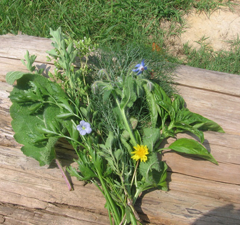Offering quality Icelandic Sheep and Angora Rabbits in a full range of natural colors!
Herbs for rabbits |
 |
| Mint/Sage: dries up lactating does Fennel: Stimulates appetite and helps milk production Borage: Helps with stress and milk production Oregano: cures coccidia Lemon Balm: Helps with heart and circulatory functions, reduces stress,helps nausea, diarrhea, and gas. Dill: Fever recuperation and immune support Garlic: bug and parasite repellent and blood thinning Lavender: stimulates uterus and jump starts labor (feed with parsley) Parsley: Good overall for wool block, diarrhea, appetite stimulant, provides calcium, immune support, digestion, and soothes stomach Dandelion: Gives vitamin A, strengthens stomach, relieves arthritis, invigorates, detoxifies, helps milk production, cures constipation. Great for indigestion, skin,gastrointestinal, urinary tract, and supports good body condition. |
| Angora Rabbits | ||
Angora are one of the oldest domestic rabbits originating from Ankara, Turkey. Popular pets with French royalty in the 1700s angoras were brought to the United States in early 1900s. Four breeds are recognized by the ARBA (American Rabbit Breeders of America). These are the French, English, Satin, and Giant. Angoras are very docile with an adorable puppy dog look. They are breed for their long soft wool used by hand spinners for making luxury items. Angoras are wonderful calm pets that can be litter box trained! Great for show and 4-H projects. Housing and Feeding Angoras A well ventilated and clean environment is needed. Angoras can be housed outside but I feel it is best to place them in a building. If housed outside give your rabbits protection from the sun and drafts. A good size of cage for an angora is 24"x30"x18". Plan to have an area for your rabbit to play. Just like people, angoras benefit from exercise. An old play pen or enclosed porch will work fine. Keep them supplied with plenty of fresh water. Feed them around 3/4 cup of rabbit pellets per day. I also give them alfalfa cubes and some bird seed to prevent wool block. Treats are ok but don't give them too many or they will get diarrhea. |
Good snacks include carrots, apples, corn, grass, banana, pineapple, and dried bread. Never give your rabbit lettuce as it causes almost instant diarrhea. Do not give snacks to bunnies under 6 mo. of age. Also, don't give parsnips, potatoes, tomatoes, and cabbage. It is a good idea to worm your rabbit.This helps to prevent wool mites and pin worms. You will know that your rabbit has wool mites if they are itching and have red irritated patches of skin. It may also look like really bad dandruff. Worming can be done by using liquid Ivomec . Draw the liquid into a syringe and remove the needle. Place one tiny drop on the rabbits tongue and let it lap the liquid up. You can spot treat wool mites with cat flea powder if you prefer. Don't use any other kind of flea powder as it can be poison to rabbits. Breeding Yes- we do eat them if they are not good quality! No- we do not kill them to harvest the wool! The quality producers stay and live very comfortable lives. |